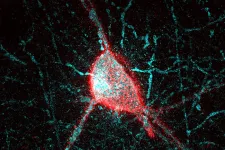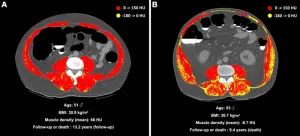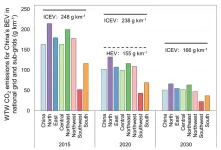(Press-News.org) The National Institutes of Health is now enrolling participants in a landmark initiative to advance nutrition research. Nutrition for Precision Health, powered by the All of Us Research Program, or NPH, is working with 14 sites across the United States – including Pennington Biomedical Research Center and LSU Health Sciences New Orleans in Louisiana – to engage 10,000 participants from diverse backgrounds and learn more about how our bodies respond differently to food.
“Nutrition for Precision Health brings us a step closer to precision medicine. The study will generate a massive dataset, a wealth of biospecimens and the algorithms that will lead to personalized dietary prescriptions that can promote health, prevent heart attacks or strokes, and importantly, address health disparities,” said Pennington Biomedical Executive Director John Kirwan, Ph.D.
NPH will use artificial intelligence-based approaches to analyze information provided by participants in order to develop algorithms that predict responses to dietary patterns. The study’s findings may one day allow healthcare providers to offer more customized nutritional guidance to improve overall health.
“Poor diet is one of the leading causes of preventable disease and death around the world. If everyone followed the healthy eating guidelines that we have available now, we still may not achieve optimal health because our bodies respond differently to food,” said Holly Nicastro, Ph.D., MPH, coordinator of NPH. “Through this study, we are looking to better understand differences in individual responses and pave the way for more tailored guidelines in the future.”
Nutrition is important for the prevention and treatment of most chronic conditions and diseases, including hypertension, diabetes, and stroke. However, current dietary recommendations do not consider individual biological differences in how people respond to foods or ways and timing of eating. The goal of precision nutrition is to move from a “one-size-fits-most” approach to more specific recommendations that are based on each individual’s unique characteristics and environments.
“Food lies at the epicenter of health and disease. But clinical nutrition is still limited to a one-size-fits-all-approach that far too often fails a large segment of the population,” said Eric Ravussin, Ph.D., Associate Executive Director for Clinical Science at Pennington Biomedical Research Center.
NPH will study how a range of factors, including genes, lifestyle, health history, the gut microbiome (the community of microorganisms that live in the human gastrointestinal tract), and social determinants of health (the conditions in which people live, work, and age that affect health), influence a person’s response to diet.
To participate in NPH, individuals must be aged 18 or over and must enroll in or already be enrolled in NIH’s All of Us Research Program. All of Us is an effort that aims to engage at least 1 million participants in building a health database that reflects the diversity of the U.S., to help speed up medical research and enable individualized prevention, treatment, and care options.
The NPH study consists of three components. All study participants will participate in the first component, while a subset will take part in the other two components. In the first component of the study, participants will be asked to complete surveys, report their daily diets, and provide blood, urine, and stool samples for lab tests, including microbiome analysis. In the second component, a subset of participants will be given diets selected by researchers. In the third component, participants will also be given diets selected by researchers but will be requested to reside in a research center while on the diets.
Participants from all three components of the study will participate in meal challenge tests that measure biological changes after they consume a standardized study-provided meal or drink. Participants will receive interpreted information from the study on their health, including body fat percentage, microbiome makeup, metabolism, and diet composition.
“What we need is precision, the ability to prescribe diets that account for the factors unique to each person, such as their genetics, metabolism, physiology, behavior, even the microorganisms in their body,” said Leanne Redman, Ph.D., Associate Executive Director for Scientific Education at Pennington Biomedical.
NPH will link participants’ data from the study to information obtained through the All of Us Research Program, including genetics information and data from electronic health records and additional surveys. The study will leverage advances in AI to analyze this vast amount of data from participants to develop algorithms predicting how a person will respond to a particular food or diet based on various factors. All of this data will ultimately be accessible through All of Us’ data platform, the Researcher Workbench, to support many other studies on health and disease. Strict safeguards are in place to keep the data secure and protect participant privacy.
“Nutrition is perhaps one of the most powerful medicines we have available, but is among the least understood,” said Geoffrey Ginsburg, M.D., Ph.D., All of Us’ chief medical and scientific officer. “By tapping into the All of Us infrastructure and platform, NPH will be set apart from other nutrition studies by its scale and diversity. The value of NPH will be amplified by the research community as new data types are made broadly available in the Researcher Workbench to explore and advance our understanding of nutrition and health.”
NIH funded six clinical centers to conduct the study at enrollment sites in various regions of the country. These centers will implement the study modules and engage diverse communities to participate in NPH.
NPH is led by multiple institutes and centers within NIH, including the NIH Common Fund; All of Us Research Program; Office of Nutrition Research; National Institute of Diabetes and Digestive and Kidney Diseases; National Heart, Lung, and Blood Institute; Eunice Kennedy Shriver National Institute of Child Health and Human Development; National Cancer Institute; and National Center for Advancing Translational Sciences.
Currently, the NPH study materials are available only in English. Spanish-language materials will be available at a future date.
To learn more about NPH and how to join the study, please visit https://nutritionforprecisionhealth.org/. To enroll at Pennington Biomedical, visit https://www.pbrc.edu/nph.
The work described here is supported by National Institutes of Health award # 1 UG1 HD107696-01.
“All of Us” and “Nutrition for Precision Health, powered by the All of Us Research Program” are service marks of the U.S. Department of Health & Human Services.
About the NIH Common Fund
The NIH Common Fund encourages collaboration and supports a series of exceptionally high-impact, trans-NIH programs. Common Fund programs are managed by the Office of Strategic Coordination in the Division of Program Coordination, Planning, and Strategic Initiatives within the NIH Office of the Director in partnership with the NIH Institutes, Centers, and Offices. More information is available at the Common Fund website: https://commonfund.nih.gov.
About the All of Us Research Program
The mission of the All of Us Research Program is to accelerate health research and medical breakthroughs, enabling individualized prevention, treatment, and care for all of us. The program will partner with one million or more people across the United States to build the most diverse biomedical data resource of its kind, to help researchers gain better insights into the biological, environmental, and behavioral factors that influence health. For more information, visit www.ResearchAllofUs.org, www.joinallofus.org, and https://www.allofus.nih.gov/.
About the National Institutes of Health
NIH, the nation's medical research agency, includes 27 Institutes and Centers and is a component of the U.S. Department of Health and Human Services. NIH is the primary federal agency conducting and supporting basic, clinical, and translational medical research, and is investigating the causes, treatments, and cures for both common and rare diseases. For more information about NIH and its programs, visit www.nih.gov.
About the Pennington Biomedical Research Center
The Pennington Biomedical Research Center is at the forefront of medical discovery as it relates to understanding the triggers of obesity, diabetes, cardiovascular disease, cancer and dementia. The Center architected the national “Obecity, USA” awareness and advocacy campaign to help solve the obesity epidemic by 2040. The Center conducts basic, clinical, and population research, and is affiliated with LSU.
The research enterprise at Pennington Biomedical includes over 480 employees within a network of 40 clinics and research laboratories, and 13 highly specialized core service facilities. Its scientists and physician/scientists are supported by research trainees, lab technicians, nurses, dietitians, and other support personnel. Pennington Biomedical a state-of-the-art research facility on a 222-acre campus in Baton Rouge.
For more information, see www.pbrc.edu.
END
NIH launches largest precision nutrition research effort of its kind
Enrollment opens at 14 sites nationwide, including Pennington Biomedical, to drive advances in precision nutrition
2023-05-16
ELSE PRESS RELEASES FROM THIS DATE:
Study first to examine how early memory changes as we age at a cellular level
2023-05-16
How do our brains become capable of creating specific memories? In one of the first preclinical studies to examine memory development in youth, a research team at The Hospital for Sick Children (SickKids) may have identified a molecular cause for memory changes in early childhood.
Event-based memories, also known as episodic memories, are what people traditionally think of when they hear the word memory: a recollection tied to a specific context. For young children, however, memory is more general or “gist”-like, and these general recollections are typically not tied to a specific context.
In a study published in ...
New paper introduces ethics framework for use of Generative AI in healthcare
2023-05-16
A new paper published by leading Australian AI ethicist Stefan Harrer PhD proposes for the first time a comprehensive ethical framework for the responsible use, design, and governance of Generative AI applications in healthcare and medicine.
The peer-reviewed study published in The Lancet’s eBioMedicine journal details how Large Language Models (LLMs) have the potential to fundamentally transform information management, education, and communication workflows in healthcare and medicine but equally remain one of the most dangerous and misunderstood types of AI.
“LLMs used to be boring and safe. They have become exciting ...
Accomplished molecular biologist to lead new group at MDI Biological Laboratory
2023-05-16
Halyna Shcherbata, Ph.D., will lead a new research group at MDI Biological Laboratory, in the Kathryn W. Davis Center for Regenerative Biology and Aging. Shcherbata's work has focused on regulatory and other roles of non-coding microRNA in gene expression and maintenance, and disorders such as muscular dystrophy and developmental delay. She is already developing new facilities for Drosophila melanogaster fruit flies on campus, returning an esteemed stand-in for human physiology to the Laboratory’s roster of animal models.
In her new lab on Maine's Mt. Desert ...
Muscle fat linked to higher mortality risk
2023-05-16
OAK BROOK, Ill. – Asymptomatic adults with a high accumulation of fat in their muscles, known as myosteatosis, are at an increased risk of major adverse events and death, according to a study published in Radiology, a journal of the Radiological Society of North America (RSNA).
One of the methods used by physicians to estimate body fat in patients is the body mass index (BMI). Since BMI is calculated using only a patient’s height and weight, it’s not an accurate reflection of body composition ...
ChatGPT passes radiology board exam
2023-05-16
OAK BROOK, Ill. – The latest version of ChatGPT passed a radiology board-style exam, highlighting the potential of large language models but also revealing limitations that hinder reliability, according to two new research studies published in Radiology, a journal of the Radiological Society of North America (RSNA).
ChatGPT is an artificial intelligence (AI) chatbot that uses a deep learning model to recognize patterns and relationships between words in its vast training data to generate human-like responses based on a prompt. But since there is no source of truth in its training data, the tool can generate responses that are factually ...
MD Anderson awarded over $5.7 million from Break Through Cancer to support AML research
2023-05-16
HOUSTON – The University of Texas MD Anderson Cancer Center was awarded more than $5.7 million in grants from Break Through Cancer to support collaborative research teams working to discover novel molecular targets to eradicate minimal residual disease in acute myeloid leukemia (AML) and to treat clonal hematopoiesis, a precursor to AML.
MD Anderson received $2.7 million to fund research for the Targeting Clonal Hematopoiesis to Prevent AML TeamLab and $3 million for the Eradicating Minimal Residual Disease in AML TeamLab. The projects expand upon work initiated within MD Anderson’s Myelodysplastic Syndromes and Acute Myeloid ...
Magnetic stimulation may improve the pain, nausea of diabetic gastroparesis
2023-05-16
AUGUSTA, Ga. (May 16, 2023) – Magnetic stimulation of a group of nerves key to how our gut and brain communicate may help correct the conversation that goes awry in painful, debilitating diabetic gastroparesis, researchers say.
Patients come to Amol Sharma, MD, because their stomachs constantly hurt, they are always nauseous and they can’t or won’t eat or drink. Sometimes they can’t get out of the hospital because of nausea and vomiting.
“Gastroparesis is suspected in about 2% of the population, which is the about the population of Missouri, but only confirmed in .2% ...
Genetic analysis of Indigenous Taiwanese peoples sheds light on Austronesian expansion
2023-05-16
The Austronesian language family is one of the largest in the world, comprising over 1,200 languages spoken from Madagascar to Hawaii. Dang Liu, Albert Min-Shan Ko and Mark Stoneking collected genome-wide data from 55 individuals from seven Taiwanese Austronesian groups and two Han-Taiwanese groups to study the genetic structure of Taiwan, the point of origin for all Austronesian-speaking peoples. There are over 20 different Indigenous groups in Taiwan, divided into “highland” and “lowland” peoples. Many lowland peoples have intermarried with Han people, and their languages are endangered or extinct. ...
Emissions reductions of Chinese EVs
2023-05-16
Chinese electric vehicles (EVs) drive larger emissions reductions over time, due to increased operating efficiency and a greener electricity mix, according to a study. More than 10% of Chinese car sales are now electric, but the full life cycle of EVs still creates carbon emissions. Shaojun Zhang and colleagues conducted “cradle-to-grave” life cycle assessments for EVs in 2015 and 2020, including fuel-cycle and material-cycle phases, and compiled life-cycle projections for 2030. The authors considered factors including sources of electricity, vehicle fuel economy, major automotive metals, and battery ...
Cognitive training helpful for some but not a panacea for fall prevention
2023-05-16
INDIANAPOLIS – One out of four adults, age 65 or older, falls every year in the U.S. Falls cause approximately 36,000 deaths annually in this age group, making it the leading cause of death from injury for older adults in the U.S.
A new study, led by Regenstrief Institute Research Scientist Briana Sprague, PhD, examines whether cognitive training – specifically, speed of processing, memory and reasoning training -- can lower the risk of falling. Significantly, the researchers found no effects of the training on likelihood of falling for those at low risk of falling. Dr. Sprague also is a faculty member at Indiana ...
LAST 30 PRESS RELEASES:
Power in motion: transforming energy harvesting with gyroscopes
Ketamine high NOT related to treatment success for people with alcohol problems, study finds
1 in 6 Medicare beneficiaries depend on telehealth for key medical care
Maps can encourage home radon testing in the right settings
Exploring the link between hearing loss and cognitive decline
Machine learning tool can predict serious transplant complications months earlier
Prevalence of over-the-counter and prescription medication use in the US
US child mental health care need, unmet needs, and difficulty accessing services
Incidental rotator cuff abnormalities on magnetic resonance imaging
Sensing local fibers in pancreatic tumors, cancer cells ‘choose’ to either grow or tolerate treatment
Barriers to mental health care leave many children behind, new data cautions
Cancer and inflammation: immunologic interplay, translational advances, and clinical strategies
Bioactive polyphenolic compounds and in vitro anti-degenerative property-based pharmacological propensities of some promising germplasms of Amaranthus hypochondriacus L.
AI-powered companionship: PolyU interfaculty scholar harnesses music and empathetic speech in robots to combat loneliness
Antarctica sits above Earth’s strongest “gravity hole.” Now we know how it got that way
Haircare products made with botanicals protects strands, adds shine
Enhanced pulmonary nodule detection and classification using artificial intelligence on LIDC-IDRI data
Using NBA, study finds that pay differences among top performers can erode cooperation
Korea University, Stanford University, and IESGA launch Water Sustainability Index to combat ESG greenwashing
Molecular glue discovery: large scale instead of lucky strike
Insulin resistance predictor highlights cancer connection
Explaining next-generation solar cells
Slippery ions create a smoother path to blue energy
Magnetic resonance imaging opens the door to better treatments for underdiagnosed atypical Parkinsonisms
National poll finds gaps in community preparedness for teen cardiac emergencies
One strategy to block both drug-resistant bacteria and influenza: new broad-spectrum infection prevention approach validated
Survey: 3 in 4 skip physical therapy homework, stunting progress
College students who spend hours on social media are more likely to be lonely – national US study
Evidence behind intermittent fasting for weight loss fails to match hype
How AI tools like DeepSeek are transforming emotional and mental health care of Chinese youth
[Press-News.org] NIH launches largest precision nutrition research effort of its kindEnrollment opens at 14 sites nationwide, including Pennington Biomedical, to drive advances in precision nutrition









